Back in the infancy of search, keywords ruled the world.
Google and Yahoo ranked websites based on keywords; SEOs and Webmasters built web pages stuffed with keywords; and clients fell in love with the tangible results, good or bad, promised by keyword rankings: up three spots equals progress; down three spots equals regression.
But times have changed, and it’s time we change with them.
The Holy Grail of search is no longer keywords. Not for Google. Not for your website. Not for the last four years.
Which is why in 2016 and beyond, keyword rankings are no longer a relevant metric for measuring the success or performance of your search engine optimization (SEO).
Why?
Keyword rankings by themselves tell us little about the real success of your SEO. So much so that I can’t remember the last time I looked at our keyword list.
It’s only when you pair keyword rankings with user behavior metrics, traffic metrics, and achieving business goals (among other factors) that they start to become somewhat relevant.
And even then, as the current state of SEO would have it, where so much of search success depends on content creation, user engagement and experience, authority, trust, and reputation, the value of a keyword ranking is insignificant.
Today, keyword rankings lack substance; they build a false sense of security.
And obsessing over outranking your competitors could prove detrimental to your SEO.
In this article, I’ll explore eight important reasons why keyword rankings no longer suffice as a relevant metric for measuring SEO performance. And I’ll show you five ways to measure real SEO success instead.
Let’s get started.
1. Page One Doesn’t Exist Anymore… Stop Looking
Back in 2004, Google discovered that by using certain data points about the individual user they could better understand the intent of each search and therefore provide more relevant results.
So in 2005, they rolled out Personalized Search to all logged in Google account members, changing the way search results appeared to the individual. And in 2009, they rolled out Personalized Search to everyone, regardless of whether or not you were logged in.

Now, Personalized Search relies on the following contextual queues (among others) to better understand the intent of your search and serve more relevant results:
- Location of computer and IP address
- Past search history
- Demographics (age, gender, etc.)
- User behavior (click-through-rate, pogo-sticking, time spent on page, etc.)
- Browser preferences (logged in, logged out, incognito view, etc.)
- Device usage (mobile, desktop, tablet, Google app)
- Search index (Google, Google Now, YouTube, Google Maps, Google Voice, etc.)
- Social activity on Google+ (The social element of Google+ is officially dead, but Google still uses its data)
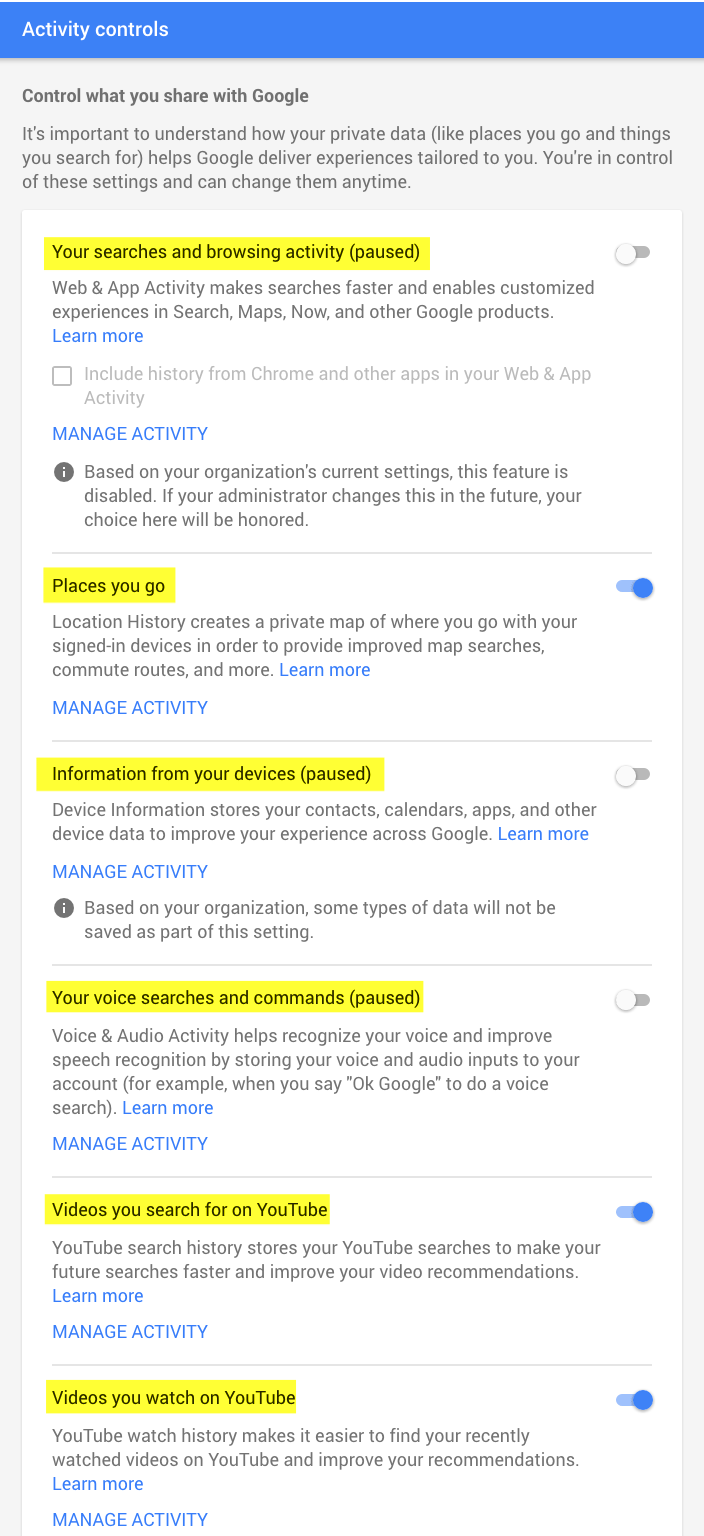
Don’t believe me? See for yourself:
- How Google uses your data: https://privacy.google.com/how-we-use-data.html
- View your Google demographic profile: https://www.google.com/settings/u/0/ads/authenticated
- View Yahoo demographic profile: https://aim.yahoo.com/aim/us/en/optout/
- View your search activity controls: https://www.google.com/settings/accounthistory
- View your privacy settings: https://myaccount.google.com/privacy?pli=1#activitycontrols
- View your historical location data and timeline: https://www.google.com/maps/timeline?
- View your YouTube search history settings: https://history.google.com/history/youtube/search?
Takeaway
Mobile results look different than desktop results. Google Voice results look different than Google Incognito results, which look different than Google Now or logged-in Google results. The same search in Northern California looks different than in Southern California. Your results look different than my results, even if we’re searching from the same location. And so on.
So when you say that you rank on page one of Google, the real question remains: For whom? Or when? Because there’s infitinite page ones.
Begging yet another question: how relevant are keyword rankings if no tool or spot-check can accurately account for personalization and context? Some tools measure the average ranking over time, but averages don’t tell us for who or when or why a keyword ranked high or low.
2. A Majority of Your Traffic Comes From Keywords You Don’t Track
We’ve all seen or created a keyword list comprised of the most highly trafficked head keywords for our industry along with our “money keywords” that we hope will drive the most profit.
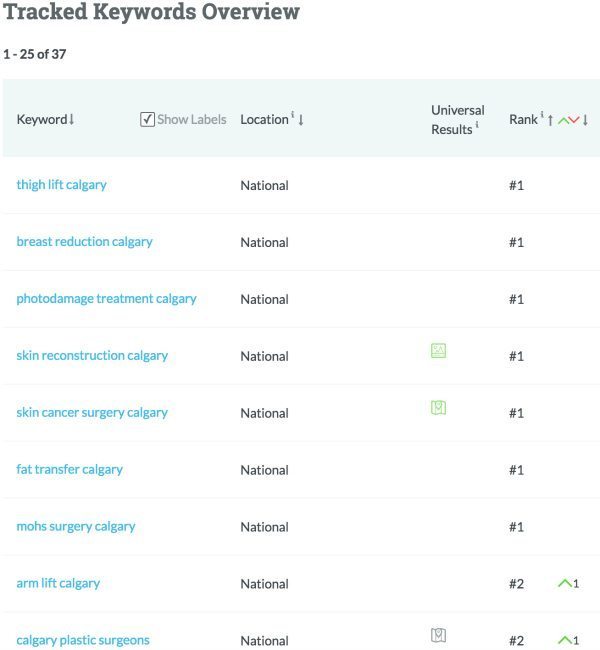
The only problem is that those keywords only represent a small fraction of how people find your website.
In fact, as much as 50-80% (or more) of your organic search traffic will come from long-tail keywords that you don’t track:
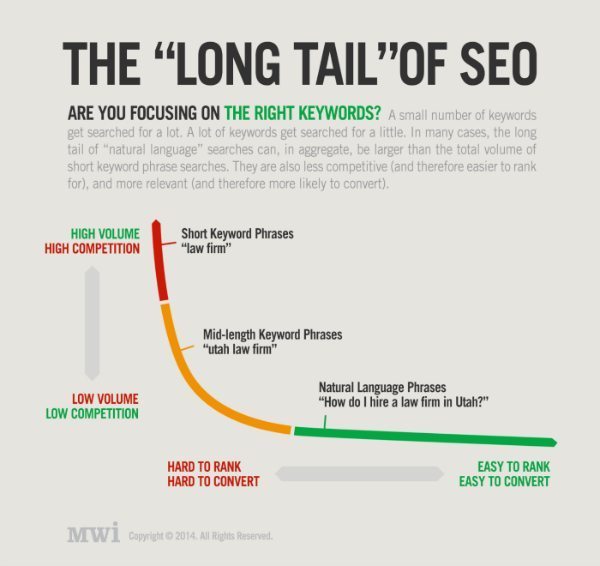
Or, if you’re like KissMetrics and Quicksprout, maybe as much as 90-92% of your organic traffic will come from long-tail keywords you don’t track.
For example:
If you were a plastic surgeon in Costa Mesa, you might track the keyword “breast augmentation Costa Mesa,” but prospective patients would find your site using the following long-tail search queries, too:
- Breast augmentation cost in Orange County
- Breast augmentation before and after photos
- Breast augmentation risks associated
- Breast implant pricing
- Breast augmentation scars
- Top breast enlargement doctor Orange County
- Boob job surgery Costa Mesa
- Safe breast augmentation doctors
- Find breast augmentation doctor near me
- Breast augmentation Newport Beach CA
The problem? You’re not tracking those keywords on your keyword list.
Takeaway
How reliable are keyword rankings if they only represents 20-50% or less of your organic traffic? Can you really determine the success of your SEO based on how well you rank for keywords that drive hardly any of your traffic? Unlikely.
To learn how much of your organic traffic comes from keywords you don’t track, visit your Google Search Console (formerly Webmaster Tools) and navigate to search analytics and see how many clicks you’ve received from long-tail keywords (non-tracked) vs. tracked keywords. Then determine the percentage.
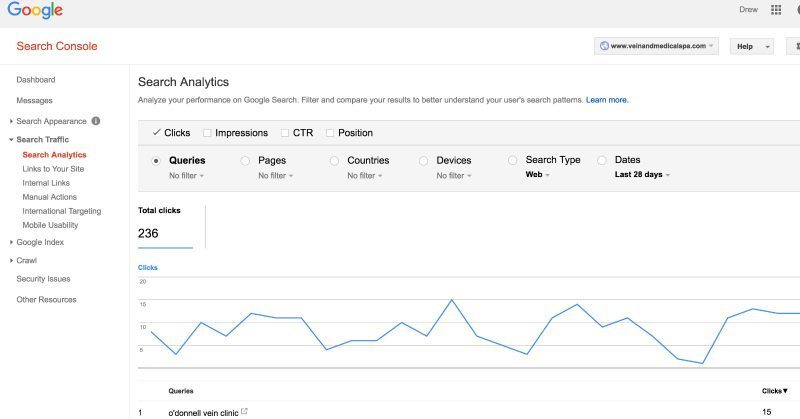
Google Search Console > Search Traffic > Search Analytics
3. Keyword Rankings Don’t Account for Changing SERP Layouts
Back when Google served only one search engine results page (SERP) layout, no matter the search query, you could estimate the value of a keyword ranking to the dollar.

“10 Blue Links”
For example, because each search query resulted in “10 blue links,” you could determine the average click-through-rate (% of clicks each ranking received) of each position, like so:
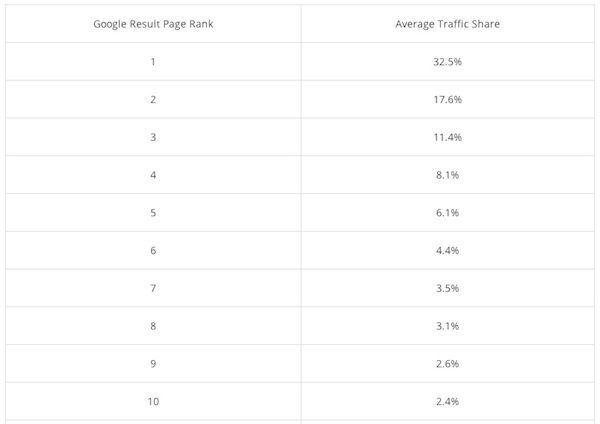
Then, using a keyword tool, you could calculate the estimated monthly search volume of each keyword and use the click-through-rates of each ranking to determine how much traffic each ranking would receive, respectively.
If “breast augmentation Costa Mesa” received 500 monthly searches, then position one would get 163 visits (32.5% of 500), position two would get 88 visits (17.6% of 500), position three would get 57 visits (11.4% of 500), and so on.
Then, using Google’s Adwords keyword planner, you could determine the cost per click (CPC) for each keyword, and multiply that cost by the estimated number of visits per ranking.

So, if the average CPC of “breast augmentation Costa Mesa” is $16.56, then keyword position one is worth $2,699.28/month ($16.56 X 163); keyword position two is worth $1,457.28/month ($16.56 X 88); and keyword position three is worth $943.92/month ($16.56 X 57).
And if you wanted to get more technical, you could use the conversion rate of a landing page times the conversion value to determine how much revenue a keyword ranking would generate.
However, now that Google constantly changes SERP layouts, it’s impossible to determine the percentage of search traffic for each ranking position. Therefore, it’s impossible to determine the worth or value of each ranking.
Takeaway
If you can no longer estimate the value of each ranking based on worth or revenue, then this data is no longer as valuable as it was before.
And, because keyword rankings don’t adjust for won or lost traffic due to changing SERP layouts, obsessing over rankings will mislead you in the long run.
For example, notice how Google has infiltrated search results with paid ads and links to other Google properties, all that take away clicks from organic results:
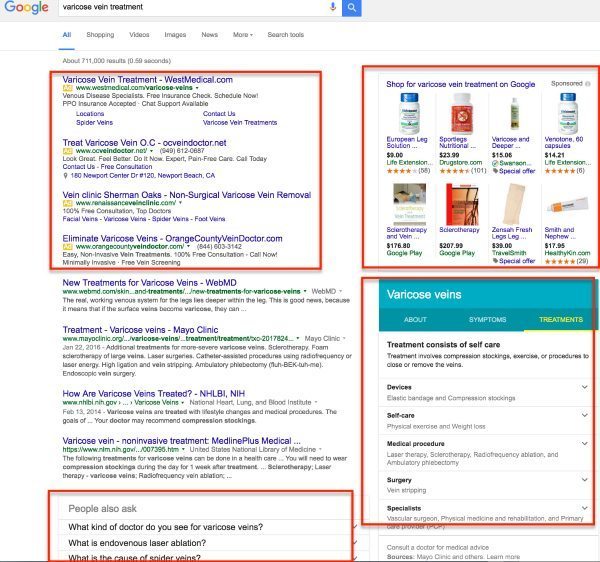
Aside from four ads on the top, certain medical keywords include a medical knowledge panel on the right.
Obsessing over ranking for “varicose vein treatment” in local results might have made sense when you were ranking number five, and when you knew that position five was worth X amount of dollars (and that wasn’t going to change).
However, as you can tell by the image above, position number five doesn’t even rank above the fold anymore.
Which also means that position number five is worth far less than it was before.
Not accounting for the reduction in value of your rankings over time creates the illusion that you’re SEO is more successful than it is, and will likely keep you from pursuing other SEO initiatives to make up for the loss.
4. Google’s Keyword Ranking Data Only Tells Half of the Story
Google provides us with two primary data sources for search engine optimization insights, user behavior, and keyword data: Google Search Console (formerly Webmaster Tools) and Google Analytics.

Google Search Console data reports on user behavior that happens before the searcher gets to your site (e.g. keywords, SERP click-through rates, impressions, clicks, and rankings).
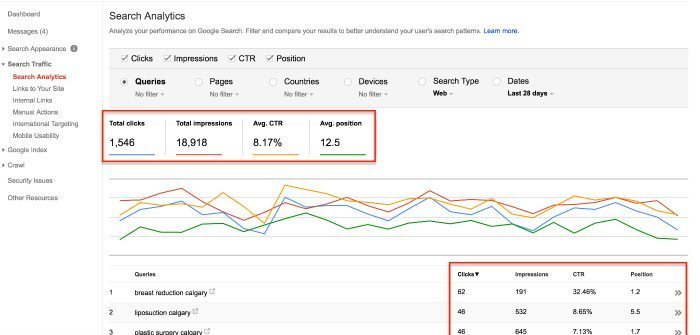
Google Analytics data reports on user behavior that happens after the searcher gets to your site (e.g. keywords, bounce rate, time on site, pages per visit, etc.).
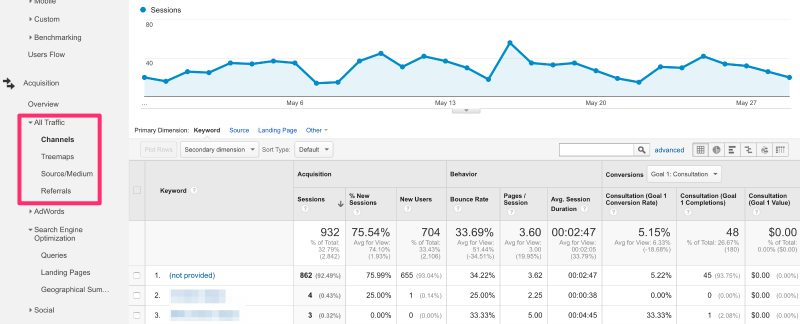
However, the data doesn’t speak to one another.
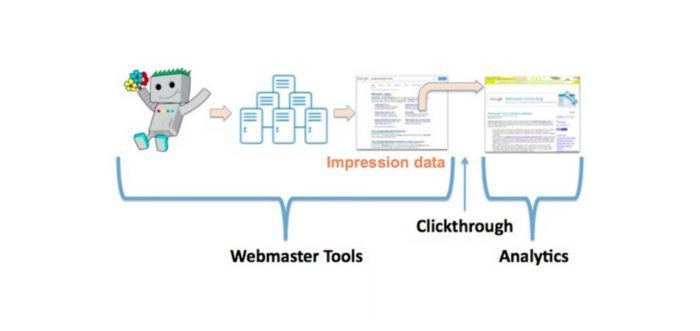
While the two sources provide an abundance of valuable data, since Search Console doesn’t tell us which keywords led to which onsite user behaviors, and vice versa, the data says little about the impact keyword rankings had on achieving our goals (e.g. conversions).
Takeaway
If you could directly connect Search Console keyword positions and clicks with Google Analytics user behavior, then you could determine which keywords led to which outcomes and which keywords were most profitable, making keyword rankings far more valuable. In fact, you used to be able to do just that before Google pulled 100% of keyword referral data from analytics.
But since you can’t track keywords to conversions (though there exist fuzzy workarounds), Google’s keyword ranking data offers little insight to the overall efficacy of your SEO.
5. Rankings Don’t Measure Interest Over Time
Consistently monitoring the search interest of a particular keyword over time allows you to adjust your keyword strategy accordingly: if interest dwindles, then it’s time to allocate resources toward a new keyword. However, keyword rankings by themselves tell you nothing about a growing or diminishing interest over time.
For example, using Google Trends, you can monitor keyword search interest over time globally, nationally, and locally. Notice how the keyword “PPC” maxed out with a score of 96 on the interest scale in 2005? And the keyword “SEO” was only at 33?
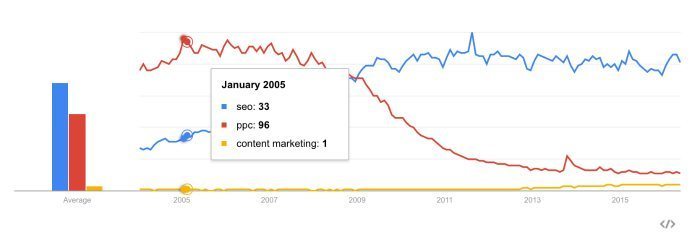
Now look how the interest for both keywords changed over the course of ten years:

Today, the roles have reversed: “SEO” is at a near peak for interest, while “PPC” has plummetted to the bottom.
This is valuable information, right? Of course.
If you were a marketing agency selling both services (like we are), you could use this data to inform your SEO strategy moving forward. More importantly, this insight would allow you to pivot your focus from “PPC” to “SEO” so you could capitalize on its growing popularity.
Takeaway
Google Trends does show us interest over time. But keyword rankings do not.
The result?
Businesses blindly chase page one rankings year after year only to reach the top of the SERPs when interest has faded, and the opportunity lost. Don’t make the mistake of thinking that keywords hold relevance over time. Not all will. Which is another reason why keyword rankings fall short of indicating successful SEO.
6. Google Doesn’t Rank Keywords Anymore. They Rank Answers
Over the last four years, Google has grown increasingly more intelligent. Now, they’re capable of understanding the context and intent of its user’s search queries, moving from Boolean search (keywords and operators) to Semantic search (contextual understanding).
And last October, they brought in RankBrain for reinforcement: a machine-learning, artificially intelligent program that works alongside the Hummingbird algorithm to help Google better understand the intent of more than 450 million daily searches that they’ve never received before.
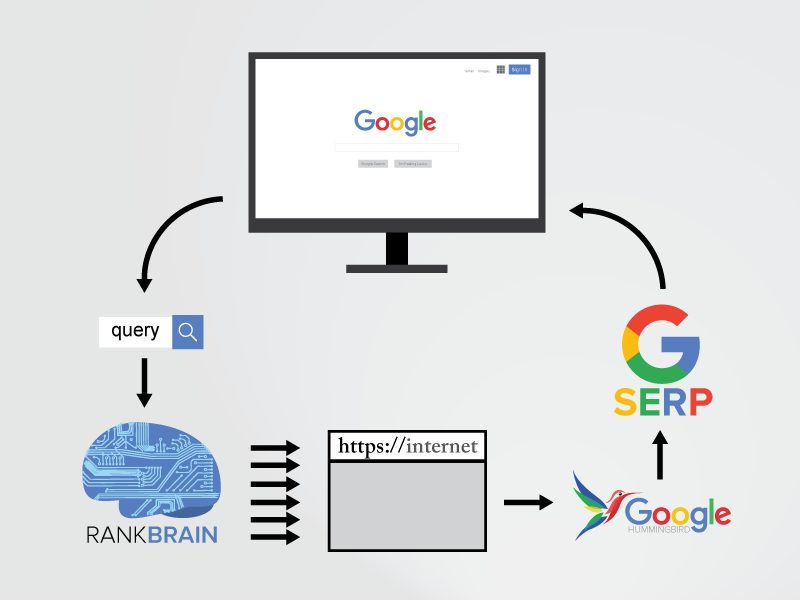
For example, when you search for “different drumstick sizes” on Google, none of the results on the entire first page include the keyword “different drumstick sizes” in the title tags or descriptions. However, all of them include answers to this particular search query on their site, nonetheless.
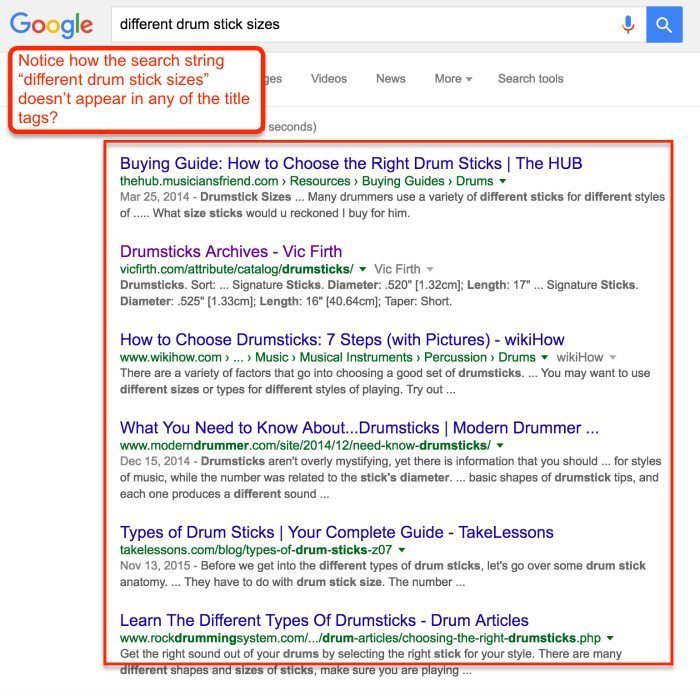
Four years ago, if you wanted to rank for “different drumstick sizes,” not only would you need to include the exact-match keyword in the title tag of the page, but you also would have needed to include it within the body copy of the page. Not anymore:

The query “different drumstick sizes” never or the word “size” never appears once on this page, and this page ranked second overall for the keyword “different dumstick sizes.”
So what happened to web pages with exact-match keywords then? They’re still there; they just don’t rank on page one anymore:
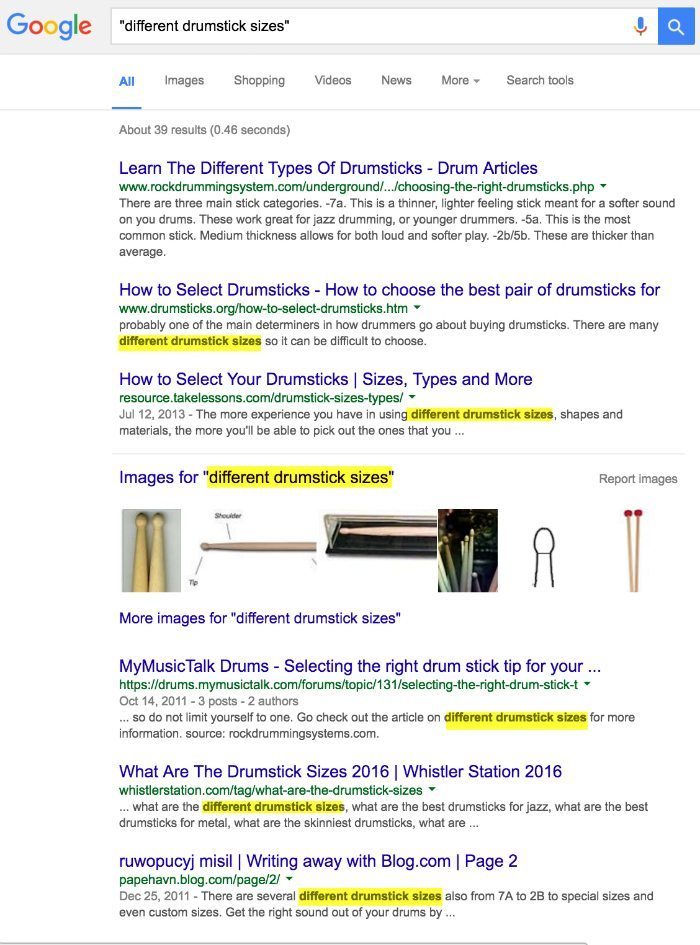
When using an operator (“”) to search for web pages with “different drumstick sizes” in the copy, you can see that exact-match keywords abound. But Google still doesn’t consider these pages more relevant than pages without the keywords on them.
Let’s look another example: Once again, before when you searched for a query like “movie with high schoolers and paddles,” Google would scour the Internet for websites with those exact keywords on the page, and if a web page didn’t include those keywords, you had no chance of ranking.
But now Google understands that you intended on finding the name of the movie Dazed and Confused:

That’s pretty impressive considering the vagueness of that search term, right?
Let’s look at one more: “Who is the president’s wife?”

Again, despite the vague search query, Google is still able to understand the intent of my search and provide the correct result.
Takeaway
Keywords have lost their relevance in search. Which makes sense: keywords emphasize the words people use, not what they want, and Google makes money by providing you with answers that you want.
Now, Google seeks to serve the best answer for a particular search query, whether or not the keywords used in that query appear on the page at all.
More importantly, RankBrain actually re-writes and refines search queries during the process. According to Brafton:

Which begs another question: If Google rewrites search queries when they think that the refined search results might lead to results that better match the intent of a query, then how relevant are keyword rankings at all? And if Google no longer uses keywords to determine the relevance of your website and the rankings of your web pages, then why should you?
Instead of obsessing over keywords, obsess over your users intent by answering user questions before they even arise.
7. Keyword Rankings Don’t Tell You How Well Your Organic Traffic Converts
Keyword rankings don’t tell us whether or not we’re doing a good job of converting organic traffic. And if we’re not converting organic traffic, then what good does a keyword ranking do us?
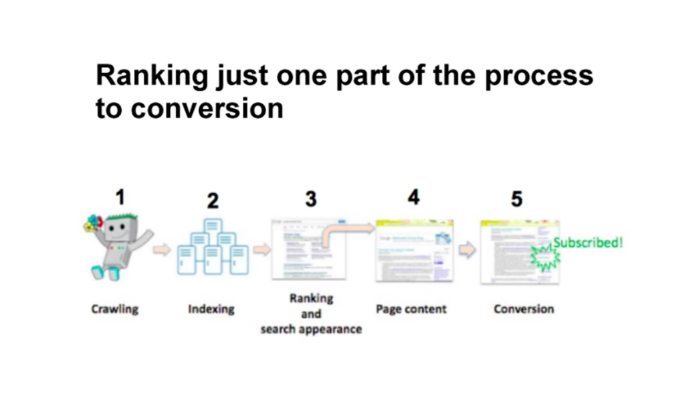
Takeaway
As Google suggests, rankings represent one step in a series of actions leading up to a successful search engine optimization program.
Before you can worry about rankings, first your website needs to be indexable and crawlable. And after your site ranks, your page content needs to satisfy the users intent and accomplish your business goals (e.g. email subscribers, downloads, consultations, etc.).
Without performing all five core steps above, your SEO won’t prove successful, no matter how high your site ranks.
Tip: Use this custom Google Analytics (here) dashboard to analyze your conversions from “not provided” keyword landing pages.
8. Keyword Rankings Won’t Protect You When Google Changes Their Algorithm
Ok, so you rank number one on Google. Great.
But what happens if Google decides to unleash a new algorithm update, and your website drops off page one completely?
Overnight, you go from 1,200 daily visits to just 200.
Would your business stay afloat? Or would your dependence on Google organic traffic be too much to shoulder the loss?
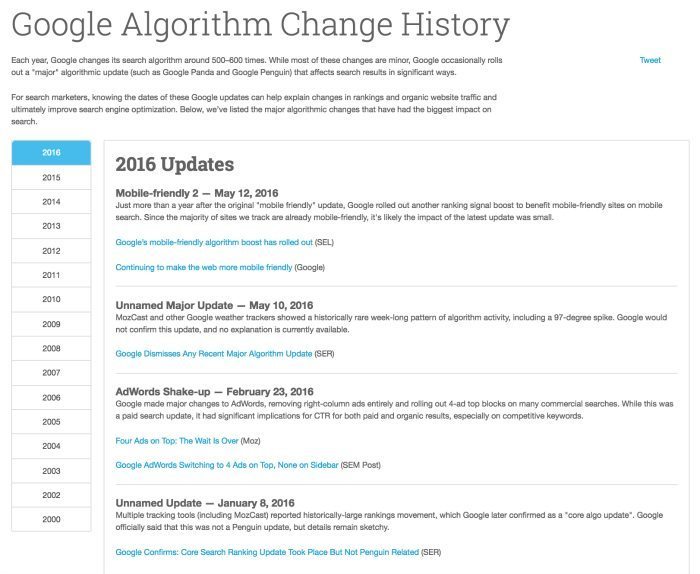
Since 2000, Google has updated their algorithm over 130 times, according to Moz.
Which means you can expect them to update their algorithm another 130 times in the next 15 years.
The question remains: will it affect you?
Not if you take a future-proof approach to search engine optimization.
For example, any SEO program worth its salt will still acquire traffic, even if rankings drop:
- Referral traffic from industry-relevant websites and vertical search engines (e.g. RealSelf.com) that have linked to your content
- Referral traffic from guest posts, comprised of your target audience (i.e. paying customers)
- Referral traffic from a diverse profile of backlinks
- Social traffic from top influencers in your industry who share your content and link to it
- Social traffic from your followers and fans
- Organic traffic from your GMB local page
- Direct traffic from email subscribers
- Increase in organic branded search traffic from increased brand awareness
- Organic traffic from long-tail keywords that still rank in abundance since you target topics and answers, not keywords
Takeaway
You might use keyword rankings as a metric to determine SEO success, but what happens if Google shifts their focus and those rankings you’ve been tracking plummet?
If you answered, “I’ll lose my business,” then you rely too much on organic traffic to begin with, but you also have a narrow-minded concept of search engine optimization.
Google, Yahoo, and Bing are just a few of the places your customers are looking for answers to problems that you solve. And rankings are just one of many byproducts of good SEO.
Any successful SEO program, like with everything else in marketing, will have built relationships within your industry to insulate you from algorithm updates or ranking drops. So broaden your search strategy to incorporate a sustainable, diverse flow of traffic from all across the web, and build relationships that will benefit your SEO and your business forever.
How To Measure SEO Success Instead
Ok, so now you know why keyword rankings aren’t the best way to measure the overall success of your SEO. So what should you measure instead?
Luckily, where keyword rankings fall short, a host of other metrics make up.
- Overall traffic
- User behavior metrics
- Content groups
- Authority
- Business objectives
Let’s explore each.
1. Overall Traffic
Since so much of successful, sustainable SEO relies on optimizing content for discovery and conversions, overall traffic, including organic traffic, referral traffic, direct traffic, and social traffic is a better indicator of success as opposed to just organic traffic.

Google Analytics: All Traffic > Channels
If your overall traffic grows, month over month, then the right people are discovering your content in all the places they are looking for it.
I know what you’re thinking: Social traffic? Absolutely.
To rank in search and win organic traffic, your content requires white-hat backlinks. And to earn backlinks, first influencers need to discover your content: social just happens to be the primary channel for content discovery, and it abounds with influencers.
So, yes, if your content is strong enough to sustain your search strategy, then that means that social was a primary channel for building relationships with influencers, and you can take credit for a portion of social traffic, too. And you should.
2. User Behavior Metrics
Though keyword rankings don’t tell us anything about user behavior, content consumption metrics do.
If your content does its job well, your visitors will not only stay on your site and engage with more content, but they’ll keep coming back too. And your SEO will directly benefit.

Google Analytics: Behavior > New vs. Returning
- Bounce rate: When people get to your site, are they staying or leaving? Note: blog posts will have higher bounce rates than service pages.
- Average time on page: Are you providing the answers your visitors intended on finding? The more relevant, the more time spent.
- Pages per visit: User experience is part and parcel of SEO. Is each page optimized to take the user on a journey toward finding the answers they need, effortlessly?
- Return visitors: Are they picking up what you’re putting down? If so, organic search visitors will keep coming back!
3. Content Groups (Rank Indexes)
Hat tip to AJ Kohn for this one:

Measuring traffic from a handful of keywords that you’re tracking doesn’t account for long-tail traffic (as we mentioned earlier), which could comprise as much as 90% or more of your traffic. However, you can group like pages into content segments withing Google Analytics and measure the overall increase in organic traffic as a group- this will ensure that you’re also tracking long-tail keywords.
For example, say you wanted to create a content group for all breast augmentation related pages on your site. By grouping the URLs of each page that talks about breast augmentation (e.g. /breast-augmentation, /blog/saline-implants, /breast-recovery) into a Google Analytics content group, you could measure user behavior at a topical category level and you could more accurately measure how well your SEO content strategy drove traffic for long-tail keywords.
While AJ explains a couple of advanced ways to do this, you can learn how to use Google Analytics to create content groups manually here.
4. Authority
Authority matters a great deal in SEO.
Sure, you can still build a ton of low-quality links and see a marginal increase in rankings, but if those links don’t build your authority and reputation, and if they don’t drive referral traffic from potential customers, then you’re missing the whole point of SEO. And Google won’t reward you over the long haul.
To better understand the efficacy of your SEO efforts, monitor your links, citations, mentions, and social shares, and pay particular attention to who is doing the linking and sharing- quality trumps quantity.
Again, you can amass links from irrelevant websites or shares from irrelevant profiles and still increase your keyword rankings marginally, but if you’re not increasing your authority and the quality of earned links and mentions, then who cares? Google won’t.
We use Ahrefs to monitor links, referring domains, citations and social shares, but you can use tools like Moz or Majestic SEO to do the same thing.
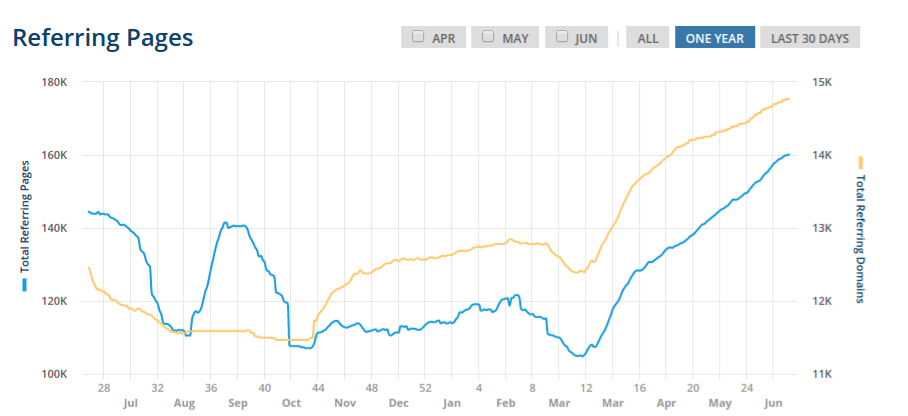
AHREFS referring domain (links to your site) graph (image source)
You can also monitor links the old fashion way: Navigate to your Google Search Console account, click on Search Traffic, then click on Links to Your Site:
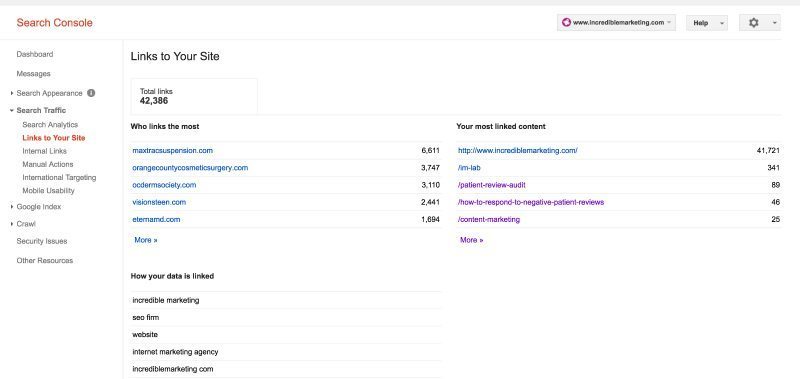
Google Search Console: Search Traffic > Links to Your Site
5. Business objectives
Finally, and most importantly, how well do your SEO efforts contribute to your bottom line? What business goals does your SEO help fulfill? What good do number one rankings do if traffic doesn’t drive revenue?
1. Goals completed/Conversions: Does organic traffic subscribe to your content? Do they download your resources? Do they register for your webinars? Do they schedule consultations? If they don’t, then you’re either acquiring the wrong type of traffic, or your visitors aren’t finding your information relevant.
2. Revenue: Is your SEO generating revenue for your business? Simple. No keyword ranking will ever tell you this, and it’s the most important metric in SEO. If the money you invest in search engine optimization doesn’t produce a return on investment, you need to revisit your strategy.

Google Analytics: Acquisition > Channels
3. Assisted conversions: Sure, a search engine might not have been the last touch point that prompted a visitor to convert. But did it contribute (assist) in the conversion? By measuring conversion based on the last touch point, you overlook how other tactics contributed to your success. So next time your social team claims all the conversion, let them know how many you assisted on 😉

Google Analytics: Conversions > Assisted Conversions
Conclusion
Keywords will always be synonymous with search engine optimization.
And, to a certain extent, keyword rankings will always have their place in SEO.
But, given that SEO has evolved so much over the last five years, keyword rankings no longer uncover the same insights that they used to- chasing rankings today is a fool’s errand.
So, rather than obsess over whether or not your favorite keyword moved up one position, obsess over how well your SEO efforts contribute to your bottom line and build your authority, trust, and reputation.
Still find keyword rankings useful when measuring the progress of your SEO? Share in the comments!
Continued reading:



